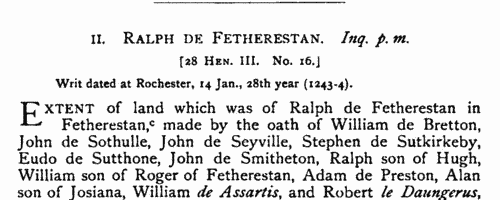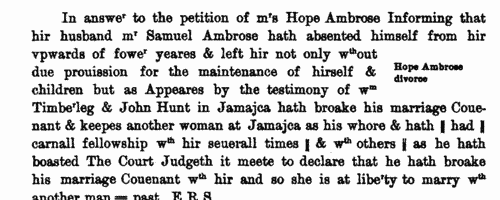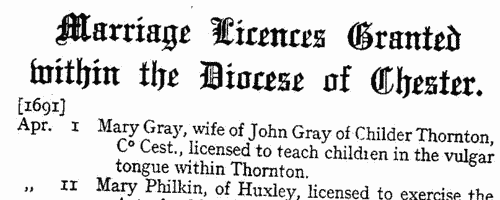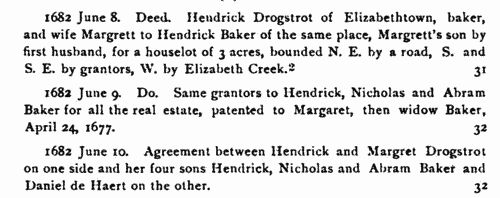Add this eBook to your basket to receive access to all 64 records. Our indexes include entries for the spelling tay. In the period you have requested, we have the following 64 records (displaying 1 to 10): These sample scans are from the original record. You will get scans of the full pages or articles where the surname you searched for has been found. Your web browser may prevent the sample windows from opening; in this case please change your browser settings to allow pop-up windows from this site. Liberate Rolls
(1240-1245)
These chancery liberate rolls of the 25th to 29th years of the reign of Henry III of England record the details of payments and allowances as part of the administration of government. Most entries start with the Latin words 'liberate', meaning 'deliver', or 'allocate', meaning allow. There are also 'contrabreves', warrants mainly to sheriffs of shires, assigning them tasks and allowing expenses. Most of the entries relate to England and Wales, but there are occasional references to Ireland and the English possessions in France. | Sample scan, click to enlarge

| Yorkshire Inquisitions
(1241-1283)
Inquisitions post mortem are inquiries as to the real estate and heir of each person holding in capite or in chief, i. e. directly, from the Crown, or whose estates had been escheated or were in ward. The age and relationship of the heir are usually recorded. Inquisitions ad quod damnum enquired as to any activities (including maladministration by local officials) that had resulted in any material loss to the Crown. Both sets of inquisitions for this period were edited by William Brown for the Yorkshire Archaeological and Topographical Association, and printed in 1891. This index covers all names mentioned, including jurors, tenants, &c. | Sample scan, click to enlarge

| London Marriage Allegations
(1611-1660)
London, Essex and part of Hertfordshire lay within the diocese of London. In the later 17th century the individual archdeaconry courts issued marriage licences, but for this period the only surviving material is from the overarching London Consistory court. The main series of marriage allegations from the consistory court was extracted by Colonel Joseph Lemuel Chester, and the text was edited by George J. Armytage and published by the Harleian Society in 1887. A typical later entry will give date; name, address and occupation of groom; name, address and condition of his intended bride, and/or, where she is a spinster, her father's name, address and occupation. Lastly we have the name of the church where the wedding was going to take place. For the later years Colonel Chester merely picked out items that he thought were of interest, and his selections continue as late as 1828, but the bulk of the licences abstracted here are from the 17th century. | Sample scan, click to enlarge

| Official Papers
(1690-1691)
The State Papers Domestic cover all manner of business relating to Britain, Ireland and the colonies, conducted in the office of the Secretary of State as well as other miscellaneous records. Includes lists of passes to travel abroad.
| Sample scan, click to enlarge

| Massachusetts Criminals, Litigants, Lawyers and Jurors
(1673-1692)
The only surviving complete volume of the records of the courts held by the Governor and Assistants of the Colony of the Massachusetts Bay is for the period 1673 to 1692. It was transcribed by John Noble, and published by order of the Board of Aldermen of the City of Boston, New England, as County Commissioners of the County of Suffolk, Massachusetts. Under English law overseas colonies were generally deemed to fall under the jurisdiction of the Admiralty, and were subject to English law varied by local circumstances. These Courts of Assistants therefore also function as Courts of Admiralty; the courts had jurisiction over criminal cases and also in civil disputes between parties. In practice, many of the names that occur in the record are just those of the members of the grand jury and the lesser juries (appointed from among the adult male householders of the colony) before whom the cases were tried. | Sample scan, click to enlarge

| Hertfordshire Sessions
(1581-1700)
Incidents from the Hertfordshire Sessions Rolls. These cover a wide range of criminal and civil business for the county, with presentments, petitions, and recognizances to appear as witnesses: many of the records concern the county authorities dealing with regulation of alehouses, religious conventicles, absence from church, highways, poaching, profanation of the Sabbath, exercising trades without due apprenticeship &c. Unlike the Sessions Books, the decisions of the justices are not recorded on the rolls, which serve more as a record of evidence and allegations. Where the date of a roll is given with an asterisk, it indicates that that particular document was not then in the county muniments, but in the archives of the Marquess of Salisbury (whose ancestors had served as Custos Rotulorum) at Hatfield House. This is a calendar of abstracts of extracts: it is by no means a completely comprehensive record of the surviving Hertfordshire sessions rolls of the period, but coverage is good. | Sample scan, click to enlarge

| Hertfordshire Sessions
(1658-1700)
Incidents from the Hertfordshire Sessions Books and Minute Books. These cover a wide range of criminal and civil business for the county: numerically, the the most cases (759) concerned not attending church; presentments about repairs to roads and bridges (247); unlicensed and disorderly alehouses (226); assault (156); badgers, higlers, &c., trading without licence (142); and trading without due apprenticeship (117). This calendar gives abstracts of all entries in the Sessions Books and Minute Books for Hertfordshire sessions for the period. | Sample scan, click to enlarge

| Lancashire and Cheshire Marriage Licences
(1691-1700)
Licences for intended marriages in Chester archdeaconry, which covered Cheshire and Lancashire south of the Ribble (by far the most populous part of that county). As shown in the sample scan, licences to practise midwifery and to teach are also included. The index covers bondsmen as well as brides and grooms. | Sample scan, click to enlarge

| Inhabitants of New Jersey
(1664-1703)
The proprietary government of New Jersey was surrendered to the Crown in 1703. The substantial early records of the colony from 1664 to 1703 were calendared by William Nelson and published by the New Jersey Historical Society in 1899 - East Jersey Libri 1, 3, 4, A, B, C, D, E, F and G; and from West Jersey the registers of New Salem Town Grants, Revel's Book of Survey, Fenwick's Surveys, Salem Surveys, Salem Deeds, Greenwich Town Lote and Gloucester Deeds. The material surveyed includes Indian deeds, patents and other conveyances, confirmatory patents, licences for purchase of lands from the Indians, town charters, court proceedings, military and civil commissions, and allowances of land for immigrant servants; but marriage certificates were omitted from this calendar, being reserved for a separate publication. | Sample scan, click to enlarge

|  Masters and Apprentices
(1713) Masters and Apprentices
(1713)
Apprenticeship indentures and clerks' articles were subject to a 6d or 12d per pound stamp duty: the registers of the payments usually give the master's trade, address, and occupation, and the apprentice's father's name and address, as well as details of the date and length of the apprenticeship. 1 January to 31 December 1713. | Sample scan, click to enlarge

|
Research your ancestry, family history, genealogy and one-name study by direct access to original records and archives indexed by surname.
|












